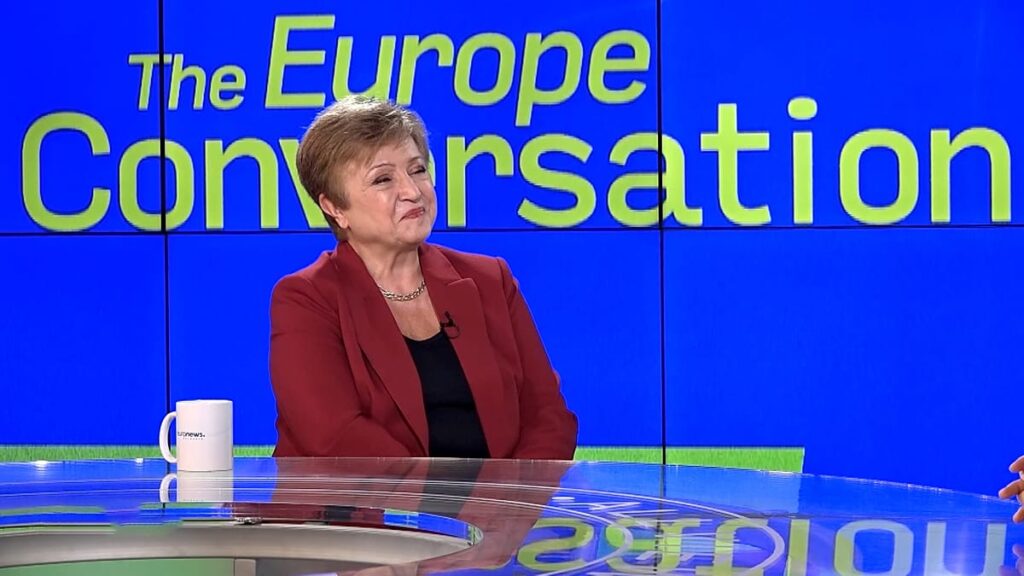Published on
•Updated
The European Union needs a ‘single market czar’ with authority and international stature to implement the Draghi report or risk losing momentum, the Managing Director of the International Monetary Fund Kristalina Georgieva told Euronews in an exclusive interview.
Georgieva praised the report published last year by the former head of the European Central Bank Mario Draghi but called for a faster implementation at an “existential moment” for Europe.
She argued that the complexities of Brussels coupled with the broad range of issues that the report tackles require a single voice with the authority to make decisions on behalf of the EU 27 member states and across sectors to complete the single market.
“The issue is agreeing on who has the delegated authority, and this authority will have to cut across the main areas of the single market,” she told Euronews flagship interview programme The Europe Conversation. “Right now, it is just too complex and it’s not moving fast enough.”
In his report, Draghi presented a comprehensive reform agenda for the EU — facing what he described as a moment of radical change or slow agony — touching key areas like competition, energy and innovation.
Before leading the IMF, Georgieva herself served as European Commissioner from 2010 to 2016.
“I used to be a Commissioner, and I know what it is like. Unless you are given full authority, it is very difficult to break through,” she added. “When you look at the single market, it is too split among the Council and the different Commissioners running things.”
While the European Council, which represents the 27 member states, gives the political direction, the Commission ensures its execution.
Georgieva pointed to the Barnier model during the Brexit negotiations as effective decision-making.
At the time, Michel Barnier, a French politician with more than 40 years of experience, was appointed the EU’s chief Brexit negotiator. He negotiated on behalf of the bloc, handled talks directly with British officials and centralised decision-making.
The Barnier model worked, according to Georgieva, because “he was one person, with full access to the heads of states, all resources of the Commission, and negotiated directly. In the end, all member states enjoyed the results.”
Since the Draghi report was published last year, the former Italian central banker has emerged as the voice with the most gravitas in Europe. His speeches are closely followed by heads of state, widely read in diplomatic circles in Brussels, the capitals and the European Commission.
Draghi was critical of the way the EU conducted trade negotiations with the US. He has long argued that the bloc should behave like a federal state in key areas like defense and expressed frustration at Europe’s secondary role in international diplomacy from Ukraine to the Middle East.
For her part, Georgieva praised the European leadership for rejecting an escalation in the trade war initiated by the US government following the so-called ‘Liberation Day’ in April, in which sweeping unilateral tariffs were introduced by the Trump administration.
Over the summer, the EU accepted a deal which raised tariffs to 15% on European exports as the lesser evil, arguing that a single, fixed rate would provide certainty to business and consumers. The deal caused a political storm after the Commission was accused by critics of “capitulating” to the detriment of European interests and in favour of the US.
A survey published by the European publication Le Grand Continent in September showed 52% of participants felt Europe had been “humiliated” during the negotiation and that perception rose to 65% in countries like France.
Georgieva disagreed.
“The world would have entered a spiral of tit-for-tat,” she said. “If you look at the (tariff) rates that were announced during ‘Liberation Day’, and the effective rate today, it is much lower. Rejecting a trade war is what saved the world economy.”
The IMF chief suggested Europe had acted responsibly and should focus on removing internal barriers within the EU’s single market and broadening its network of trading partners beyond the US.
Read the full article here


